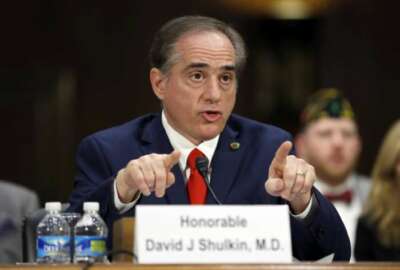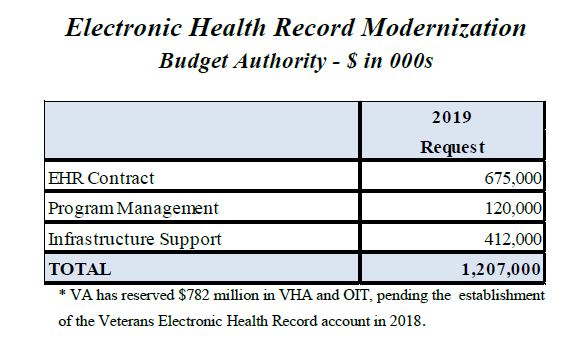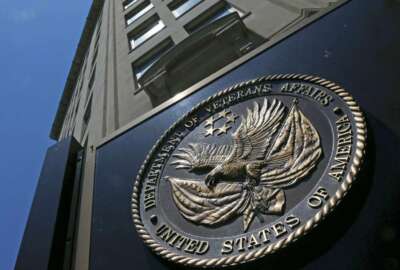

Veterans Affairs Secretary David Shulkin said Thursday he would reimburse the U.S. Treasury for his wife's travel expenses and instead wanted to turn attention back...
Veterans Affairs Secretary David Shulkin said he would reimburse the U.S. Treasury for his wife’s travel expenses and Wimbledon tennis tickets, after the department’s inspector general faulted him for improperly mixing government work and sightseeing during an 11-day trip to Europe last summer.
VA Inspector General Michael Missal said Shulkin’s staff lied to justify his wife accompanying him on the trip. Shulkin initially fired back at the findings and called the report, which the IG released Wednesday, as an “affront on [his] spouse, [his character] and his unblemished record of service.”
But at a budget hearing early Thursday morning, Shulkin said he intended to move quickly past the issue.
“I do regret the decisions that have been made that have taken the focus off [this] important work,” he told the House Veterans Affairs Committee. “That’s why I’m here. I know that’s why all of you are here. We care deeply about this subject, and it’s the reason why, to keep the attention focused on the important things, that I’ve made the decision to reimburse the Treasury, to follow the IG recommendations, and I’m committed to doing what we have to do to focus on veterans and make this better.”
Shulkin said the department is continuing to look into confusion about his chief of staff’s email, which he said may been tampered with. The IG said VA Chief of Staff Vivieca Wright Simpson altered emails to make it appear that Shulkin received an award to justify his wife’s travel.
“We have found that somebody has taken over the chief of staff’s email and is sending emails as if it’s her,” Shulkin told reporters after Thursday’s hearing.
Leading congressional VA leaders said Wednesday they were disappointed by the recent IG report. But on Thursday morning, VA Committee Chairman Phil Roe (R-Tenn.) encouraged his colleagues to focus their questions on the department’s fiscal 2019 budget request, not the IG findings.
“I’ve instructed my staff to request additional documentation from the IG,” Roe said. “I’ve gotten to know you well over the last year, actually two years, and I believe your intentions to serve and care for our nation’s veterans are well clear. You have that mission at heart. With that said, as public officials, we’re all expected to be held to a higher standard. … We have a lot of work to do on behalf of our nation’s veterans, and we cannot let distractions like these to keep us from doing our work.”
Most members, with the exception of Rep. Mike Coffman (R-Colo.), obliged.
“I do recognize the optics of this are not good,” Shulkin said when Coffman asked him about the report’s finding again.
“It’s not the optics that are not good; it’s the facts that are not good,” Coffman said.
But for the most part, Shulkin left Thursday’s hearing relatively unscathed. Members mostly had questions about the VA’s 2019 budget proposal which totals an unprecedented $198.6 billion and is $12 billion more than the 2018 request.
Spending on VA since 2006 is up 175 percent, Roe said.

And with so many different priorities and new initiatives, members of the House VA Committee, like previous years, are concerned the department won’t strike the right balance and may devote too many resources to more controversial priorities.
The future of Veterans Choice Program and its various community care programs is certainly one of the more controversial topics. The 2019 budget includes $14.2 billion in total obligations for veterans community care programs next fiscal year and an additional $14.6 billion in advance appropriations for fiscal 2020.
VA is spending more each year on community care, but Shulkin predicted the demand for the program would eventually level out.
“We have seen a significant increase as we have begun to address the access crisis,” he said of the need for Choice funding. “As you know, this really was a significant crisis in 2014. We still have some access issues. We’re getting veterans out to be seen rather than letting them wait. That I think we all agree on. We’ve essentially reached a much slower growth rate of that.”
But committee Ranking Member Tim Walz (D-Minn.) said he’s still concerned the department is focusing its dollars on the wrong places. He said he’d rather see VA hire and fill its 30,000 vacant health care positions — rather than send patients out to the private sector providers.
“I think it’s becoming more and more difficult, Mr. Secretary, to say, “I’m not supporting privatization at the VA,’ because it appears like you are,” Walz said.
VA’s budget request would also support the hiring of 6,993 additional employees. About 600 of those new employees would work at the Veterans Benefits Administration, working through the VBA backlog of appeals and helping the department implement the new Rapid Appeals Modernization Plan (RAMP) by next February.
The department would also hire an additional 70 employees to staff VA’s new Office of Accountability and Whistleblower Protection. VA budget documents say the new hires would help address a growing appeals and accountability workload.
Several members, however, questioned whether the president’s proposed pay freeze for civilian employees next year would hurt VA’s ability to hire 7,000 new workers and fill at least 30,000 health care vacancies, as well as 4,000 unfilled logistics, human resources and contracting positions.
Shulkin seemed relatively unconcerned.
“I’m going to take the leadership from that from the president,” he said. “That would be across the administration. It’s essential to get the right people in VA [and] that we have competitive salaries. I would be concerned if we fall behind in that, so we’re going to use our market assessments that we have, particularly using Title 38, to make sure that our salaries are competitive.”
When asked whether he would support asking the president to waive the pay freeze for VA employees, Shulkin said he would.
The department in 2019 also wants to create a new budget account for the electronic health record, which VA will continue to develop and implement with Cerner Corporation for the next 10 years.

The 2019 budget includes $1.2 billion for the EHR alone. The department’s Office of Information and Technology would receive an additional $381 million in 2019 to replace certain mission critical legacy systems, including the upgrades VA needs to continue to make to some of the 130 different instances of the Veterans Information Systems and Technology Architecture (VistA).
The department has said it will continue to support each version of VistA until it implements the new Cerner system at each VA site.
One area of the department that would see cuts is within the VA Office of the Inspector General. The president’s budget proposal includes a cut of 28 FTEs to the VA OIG.
“The optics of cutting the IG today are really, really bad,” Walz said.
Copyright © 2025 Federal News Network. All rights reserved. This website is not intended for users located within the European Economic Area.
Nicole Ogrysko is a reporter for Federal News Network focusing on the federal workforce and federal pay and benefits.
Follow @nogryskoWFED


